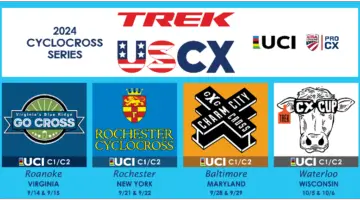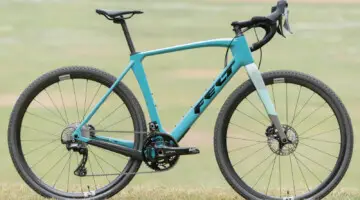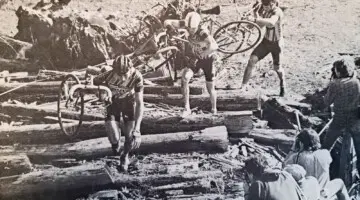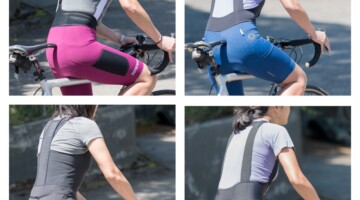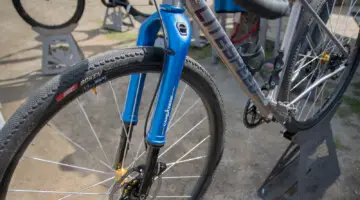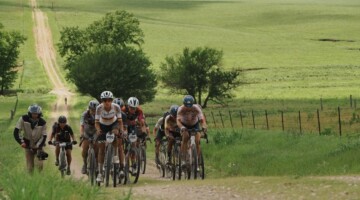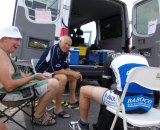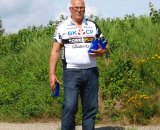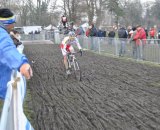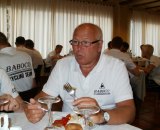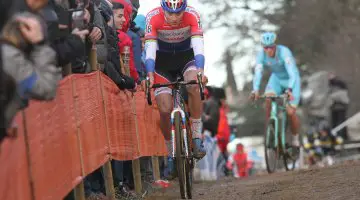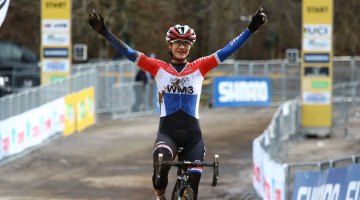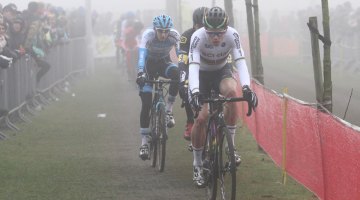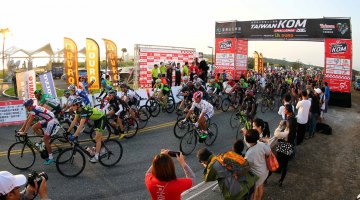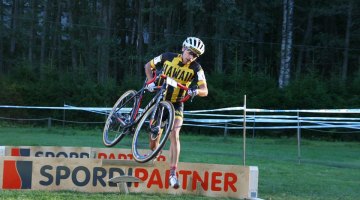by Christine Vardaros
When watching the big names like Sven Nys or Daphny van den Brand cross the finish line, you often see someone running towards them with a jacket and water bottle in hand. This “behind the scenes” character is a soigneur – the backbone to most every cyclist on race day. These folks typically take care of everything but the bike. They prepare the musettes, water bottles, and recovery shakes, spend countless hours massaging the riders before and after the events, and tirelessly wait at the start, feed zones and finish area for their racers. And, on occasion, they escort their riders to doping control.
The life of a soigneur may not appear to be the most glamorous occupation compared to their cyclists who work the front line and take all the glory, but their lives are nonetheless filled with excitement, emotional ups and downs and stories to tell for years to come.
Belgian Wilfried de Pauw has been living such a life for 26 years, since 1985. Included in his palmares are powerhouse teams such as Telekom, Rock Racing, BKCP and BABOCO. Like many soigneurs, his entry into this world began when he himself was pushing the pedals on the front line. “Before becoming a soigneur, I was a bike racer. In fact, I was the only bike racer in the family, but in my little town there were four professionals. I began racing in 1965. I raced until 1975 when I had a big accident.
“After a six-year break, I started to race again and immediately it went well; I won 12 races in the sprint. With so much success, they had me start racing with the pros which was a very big jump – especially since I was one of the older racers. With longer events at higher speeds I was riding above my limit and ended up crashing again and broke both my wrists. It was then over for me.
“Shortly after I healed, I was asked to come to a 6-day [track] race as support with massages for multiple World Champion Etienne De Wilde and Australian Danny Clark (Silver medalist on the track in 1972 Olympics).”
De Pauw was a bit nervous considering these were very big names to work on in only his first time giving massages – or any other type of racer support. They trained him on the job, the most common way soigneurs in the bike industry learned their trade. Eager to help the racers to achieve success, de Pauw was a quick study. He mastered it so well that they asked him to stay on.
Following his positive experience as a soigneur on the track, he was asked to join the road team of former Belgian Champion Willy Teirlinck (who won 96 professional victories, including stages in the Tour de France), traveling with them for many years.
A typical race day for de Pauw starts the night before when he prepares the water bottles and energy bars in advance. The next morning he wakes up well before the riders to get going on the little sandwiches for the rider’s pockets as well as for their musette bags at the feed zones. As the cyclists head out the door of the hotel they are greeted by de Pauw’s smiling face as he hands each rider their specific goodie bag containing their special request food for their pockets and drinks for their water bottles.
De Pauw then stays in place to handle any last minute request until the final rider departs the hotel. At the start line, he pops up again to collect all jackets, zip-up pants and extra water bottles. Many kilometers into the road race, he is once again present at the feed zone to hand over the bags. At the finish, he awaits with the racers’ clothing and a recovery shake. De Pauw’s day doesn’t end until late at night, after he’s massaged the riders – each massage usually taking 45 minutes – and prepared the bottles and energy bars for the next day when he does it all over again.
For cyclocross races, it’s a bit less work considering the rider has only to compete for an hour at most. He prepares the water bottles and pre-race meal usually eaten exactly three hours before the start. About 30 minutes before the start he massages the warming cream into the racers’ legs. At the start, he collects the clothes and water bottle and returns it at the finish.
Although, for the most part, there is a sort of routine to his day, every once in a while even a seasoned pro like him is thrown for a loop. Such an incident occurred in 1996 while he was working for Team Telekom at the Tour de France. “There I was, ‘kaput’ after two weeks. There was so much stress since our rider Bjarne Riis was leading the race. In the final time trial of 46km on the last day of Riis’ Tour de France win, I had to give him a bottle hand off after 26 kilometers. I was so afraid that he would miss the feed or that the bottle would drop. If I try to hand over a bottle and he doesn’t take it, it’s a big catastrophe! So I asked him the night before if I can give him the bottle in a musette bag. There is a much smaller chance he’d miss the bag than just a simple bottle hand off. Just one bottle in a bag – and it worked! I was happy and he won the race,” says de Pauw.
Every once in a while, after the riders are fast asleep and the work of the day is done, the soigneurs finally get a much deserved moment of rest and relaxation, although it doesn’t always work out as planned. De Pauw explains, “After working all day, we normally had a beer. Well, one day after small race in Spain, and after our usual beer, one of the guys decided he was going to go for a swim in the pool. All we heard was, ‘bonk’ since there was no water in the pool. That can happen [chuckles].”
When asked what he gets out of being a soigneur, he replies, “I don’t do it for the money. You don’t make anything from it. If in the hotel you have two beers, you spend as much money as you made. It’s because you like it, otherwise you wouldn’t do it. I work 19 hours in a day. Sometimes 14 riders all alone – much work.”
To support his labor of love, de Pauw holds down a full-time job outside the bike industry as a painter. As it is a government job, he has much time off for going to the races. “I used all my vacations for going with the riders. I worked 300 days a year.” His wife is clearly fine with his busy lifestyle considering she watches the bike races on television more than he does. She also visits him every year for a week of holiday when he is working the Tour de France. “She is one week with the team, in our cars and hotels – that’s super!” says de Pauw, adding, “I may be happy to go to the races, but I am also happy when I can go back home.”






